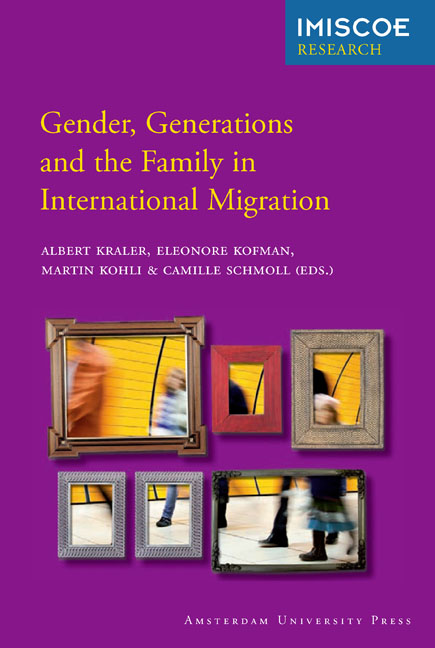Book contents
- Frontmatter
- Contents
- Preface
- 1 Introduction: Issues and Debates on Family-Related Migration and the Migrant Family: A European Perspective
- Section I The Family as a Moral and Social Order
- Section II Gender, Generation and Work in the Migrant Family
- Section III Marriage Migration and Gender Relations
- Section IV Transnational Family Lives and Practices
- List of Contributors
- Index
- Other IMISCOE titles
1 - Introduction: Issues and Debates on Family-Related Migration and the Migrant Family: A European Perspective
Published online by Cambridge University Press: 21 January 2021
- Frontmatter
- Contents
- Preface
- 1 Introduction: Issues and Debates on Family-Related Migration and the Migrant Family: A European Perspective
- Section I The Family as a Moral and Social Order
- Section II Gender, Generation and Work in the Migrant Family
- Section III Marriage Migration and Gender Relations
- Section IV Transnational Family Lives and Practices
- List of Contributors
- Index
- Other IMISCOE titles
Summary
Introduction
In recent years there has been growing interest in research and policy about family migrations and migrant families, resulting in an increasing number of projects, publications and specialised conferences. In all European states the migration of family members, which includes those accompanying workers as well as those joining citizens and settled migrants, is significant in migratory flows. In Southern Europe, there has been a dramatic increase in family flows due to larger numbers of economic migrants, regularisation programmes and introduction of legislation for family reunification. However, family migration has generally not led to debates on this topic. In Northern European states, public debate has focused on the supposedly problematic and traditional migrant family, whether it be the subordinate spouse who does not participate in the labour market, unruly and easily radicalised boys or girls being forced to conform to backward practices, such as forced and arranged marriages (Grillo this volume; Hester, Chantler, Devgon, Sharma & Singleton 2008; Migrations Sociétés 2008; Preller 2008; Rude-Antoine 2005; Sauer & Strasser 2008). In some instances female migrants are considered as being a more easily ‘assimilated’ group compared to the stigmatisation of male migrants, particularly the second generation who are frequently viewed as deviants.
The family in question (Grillo 2008) probes into the family as a contested and politicised terrain, as well as a moral order and marker of difference in multicultural societies, exploring the multiple representations of family life and practices. Whilst family migrations are complex, immigration regulations have sought to contain their geographical reach and structures; they define the composition of the family and restrict its flexibility, frequently reinforce gender inequalities and truncate the cohabitation of generations. States have institutionalised families and through juridical and political instruments constructed the modern family (Bourdieu 1996). A certain concept of family and family life has been an essential part of the conception of what constitutes a good citizen and the moral order (Schmidt 2007). This does not mean that only those forms favoured by the state exist, or that groups are unable to broaden the range of familial forms supported by the state, for example, the recognition of civil partnerships and marriage between same-sex partners.
- Type
- Chapter
- Information
- Publisher: Amsterdam University PressPrint publication year: 2012
- 6
- Cited by



